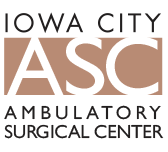OPHTHALMOLOGY
Ophthalmology
Your eyes are a critical part of your complete wellness. That’s why the ophthalmology team at Iowa City Ambulatory Surgery Center is here to provide total eyecare services. When you see an ophthalmologist, your eye care goes way beyond a simple eye exam. We check your eyes for overall health and can provide surgical solutions when they are necessary to treat eye disease.
Maintaining good eye health is essential to preserving your eyesight as you age and in case of injury. Get the care you need, so you can stop worrying about eyesight and get back to enjoying what you see.
What Does an Ophthalmologist Do?
There are a few different types of vision specialists and professionals–and they often have very similar sounding titles. That can make it hard to keep track of who you should see and when.
An optometrist can perform vision tests and prescribe corrective lenses. But an ophthalmologist can provide holistic eye health, including surgical and therapeutic treatments for eye conditions. That’s because an ophthalmologist is a medical doctor.
An ophthalmologist can help monitor your vision and fit you for eyeglasses–but they can also perform surgery, treat disease, and prescribe medication. In general, you should see your ophthalmologist regularly. Just how regularly depends on your age. The current guidelines are as follows:
- Age 20-39: Once every five years.
- Age 40-54: Once every 2-4 years.
- Age 55 and over: Once every 1-3 years, depending on your eye health.
If you notice problems with your vision, however, you should make an appointment to see your ophthalmologist as soon as possible.
Surgical Procedures Performed by ICASC Ophthalmologists
The ophthalmology team at Iowa City Ambulatory Surgery Center perform a variety of outpatient eye surgery procedures. Outpatient procedures mean you come in for your surgery in a nice, clinic-like atmosphere, and return home the same day. You never have to deal with a crowded hospital!
These two procedures are the most popular performed at ICASC.
Retina Surgery
For a variety of reasons, your retina can sometimes become detached from its supportive tissue. If you have symptoms of a detached retina, including sudden flashes of light, an unexplained shadow in your field of vision, and multiple floaters, you should seek medical attention immediately.
Once a detachment is detected, retina repair surgery can be performed by your ophthalmologist. This is an incredibly successful procedure that can prevent long term damage to your eye. In general, it may take 2-4 weeks to recover from this minimally invasive procedure; but once recovery is complete, you’ll be able to once again see normally.
Cataract Surgery
Just like a camera, your eye has a lens that allows you to control your focus–this is what lets light into your eyes and helps make your field of vision clear. For a variety of reasons, these lenses can become cloudy over time. This is called a cataract. The only permanent treatment for cataracts is a procedure called (appropriately enough) cataracts surgery.
During this minimally invasive procedure, your ophthalmologist will:
- Make a tiny incision
- Remove your cloudy lens
- Install a new, artificial lens specially designed for you
- Close the incision
Once the procedure is complete and the anesthesia has worn off, you’ll be allowed to return home. Most patients fully recover from this procedure within a week or two. And you’ll be given detailed recovery instructions to follow.
Once your recovery is complete, your vision will be markedly better. Many patients remark that suddenly the world is a lot brighter and clearer! Cataracts surgery can help improve your overall vision, make night driving easier, and make everyday activities (such as reading) easier as well.
At Iowa City ASC, our team of ophthalmologists cares about our patients and wants to restore their vision with the latest technology and techniques.
Common Cataracts Surgery Questions:
Many patients have questions about cataracts surgery. Among the most common are the following:
- How do I know if I have cataracts?
- How long will it take me to recover?
- Will cataracts surgery improve my overall vision?
- What are the risks associated with cataracts surgery?
Click here to download our resource to find answers for your cataract surgery questions.
Cornea Transplants
While we often think of the “eye” as a complete unit on its own, the reality is that your eye is composed of various parts. The cornea is the transparent tissue that sits over your iris and pupil. It’s what gives your eye that reflective quality.
The cornea is where light enters your eye, so disease or damage affecting the cornea can significantly diminish your vision. In these cases, a surgical procedure called a cornea transplant is often recommended. For most people, a cornea transplant will alleviate the symptoms and allow you to see again.
Advances in cornea transplant technique now allow your doctor to replace just the diseased layer of the cornea in some situations, called a partial corneal transplant.
During surgery:
- The damaged or diseased portion of your cornea will be removed.
- The donor cornea will be put in its place.
- The donor cornea will be sutured or held in place with a gas bubble.
Recovery for cornea transplants is usually somewhat swift, though you will have to be careful of your eyes for some time.
- You should be able to return to most normal activity after 2-3 weeks
- You may be able to return to most vigorous activity after 4-6 weeks
- If you have a job that involves much manual labor, you may have to wait 3 months to return.
During this time, you will have to take special care to avoid injuries to your eye. You may also have to wear special eye protection goggles and sleep on your back for a few weeks.
Your surgeon will provide you with detailed recovery instructions. When performed at Iowa City ASC, cornea transplants are performed as outpatient procedures. This means that after your procedure, you’ll be able to return home for your recovery.
You should count on frequent follow up appointments to make sure that your body is not rejecting the donor material and that everything is healing properly. Once your recovery is complete, your vision will be clearer and sharper than before. [1]
What Should My Next Steps Be?
If you’re ready to see your ophthalmologist, you prepare for your appointment by following these steps:
- Write down your symptoms and what’s bothering you before your appointment. This will help you know why you want to see your ophthalmologist in the first place.
- Bring some papers to your appointment so you can make sure to write down any new diagnosis or treatment options.
- If possible, bring a friend or partner with you to your appointment. They’ll be able to help you remember questions to ask–and remember what your ophthalmologist has to say too.
- Ask lots of questions during your appointment. This will help make sure you understand the information you’re given.
- Don’t be afraid to ask about alternative treatment methods. In some cases, there are alternatives to surgery. In some cases there aren’t–but your ophthalmologist may be able to work with you to find the treatment that’s right for you.
Learn more about how to take the stress out of surgery at Iowa City ASC.
The ophthalmology team at Iowa City Ambulatory Surgery Center provides comprehensive eye health and ophthalmology services, from simple screenings to therapeutic surgery. Make an appointment today to maintain your eye health–and protect your vision.
CATARACTS - WHAT THEY ARE AND HOW TO TREAT THEM
Cataract Surgery is one of the most common eye surgeries performed at Iowa City Ambulatory Surgery Center. We perform over 1,400 cataract surgeries a year.
Learn more about:
- What different types of cataracts there are
- Who is at risk
- What to expect from cataract surgery

Lorem ipsum dolor sit amet, consectetur adipiscing elit, sed do eiusmod tempor incididunt ut labore et dolore magna aliqua. Risus feugiat in ante metus dictum at. Ut consequat semper viverra nam libero justo. Ullamcorper dignissim cras tincidunt lobortis feugiat vivamus. Lorem sed risus ultricies tristique nulla aliquet enim tortor. Tortor condimentum lacinia quis vel. Nibh praesent tristique magna sit amet purus gravida

Common Symptoms of Cataracts
The most common symptoms of cataract formation is that your vision will become increasingly blurry.

Cataracts -
The Basics
It is common for adults
over 60 to begin to develop cataracts that will affect their vision.

Facts About Cataracts
Cataracts occur as the lens in your eye become cloudy. If not treated, your vision will continue to worsen as the cataract grows.





